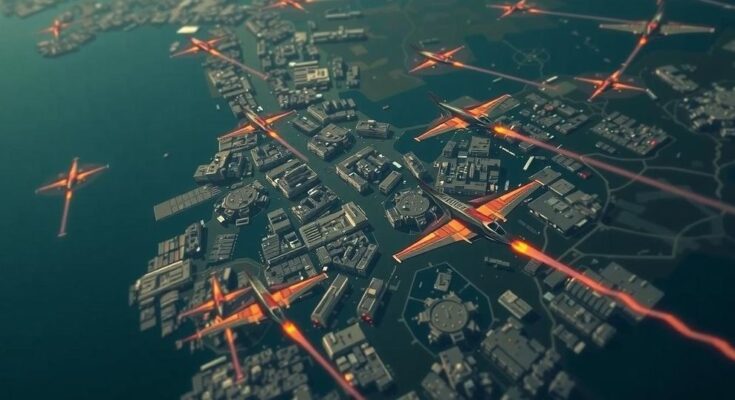Israel carried out airstrikes against Hezbollah weapons smuggling sites in Syria, testing the newly established ceasefire that began on November 27, 2024. While the ceasefire aimed to halt violence after months of conflict, reports of sporadic attacks indicate ongoing tensions. Lebanon’s displaced citizens are returning home despite warnings of continued military operations, underscoring the uncertainties surrounding the truce.
On Saturday, the Israeli military announced that its aircraft targeted Hezbollah weapons smuggling sites along the Syrian-Lebanese border, thereby testing the tenuous ceasefire that had been established just days prior. The ceasefire, which went into effect on Wednesday, November 27, 2024, followed months of conflict between Israel and Hezbollah, marked by sporadic violence that persisted despite the truce. The Israeli military claimed that the strikes were necessary due to the smuggling operations that violated the terms of the ceasefire, although immediate reactions from Syrian authorities and Hezbollah were not forthcoming.
Despite the ceasefire, there have been ongoing tensions in the region, including unrest in Aleppo, Syria, where insurgents have escalated their activities. Under the terms brokered by the United States and France, both Israeli forces and Hezbollah militants were expected to withdraw from certain positions, yet the renewed hostilities hinted at the fragile nature of the peace. Reports of shelling and drone strikes raised concerns amongst the displaced Lebanese population, who returned to their homes but faced the remnants of conflict and destruction.
The ceasefire was intended to last for two months, during which time both parties agreed to adhere to a withdrawal plan. However, accusations of ceasefire violations have surfaced from both sides, contributing to the uncertainty that characterizes the region. Many displaced individuals, numbering approximately 1.2 million, are attempting to return to their villages, despite military warnings.
Israel has justified its military actions, emphasizing its right to defend itself against any breaches of the ceasefire. Previous conflicts between the two groups date back to October 8, 2023, when Hezbollah began its attacks in solidarity with Hamas, leading to a protracted engagement that claimed thousands of lives on both sides. The recent strikes serve to highlight the challenge of maintaining stability in an area plagued by overlapping conflicts and complex geopolitical dynamics.
The ongoing conflict between Israel and Hezbollah has been a significant aspect of Middle Eastern geopolitics, rooted in historical grievances and territorial disputes. Following a series of escalations beginning in October 2023, a fragile ceasefire was brokered with international support, aimed at curbing violence and facilitating humanitarian relief. The ceasefire aims to stabilize the region temporarily and enable displaced Lebanese citizens to return home amid worries about potential future flare-ups. The attempts to control smuggling operations and military movements are part of Israel’s strategy to deter Hezbollah’s capabilities, maintaining a careful watch over its northern border and nearby regions.
The situation remains tense in the aftermath of Israel’s recent military strikes on Hezbollah smuggling locations in Syria, questioning the sustainability of the ceasefire. As both Israel and Lebanon grapple with mutual accusations of ceasefire violations amid a backdrop of continued unrest in the region, the path to lasting peace appears fraught with challenges. Despite the ceasefire’s promise, the dynamics of conflict and the marked casualties signal a complex and ongoing struggle for stability in Lebanon and surrounding areas.
Original Source: apnews.com




